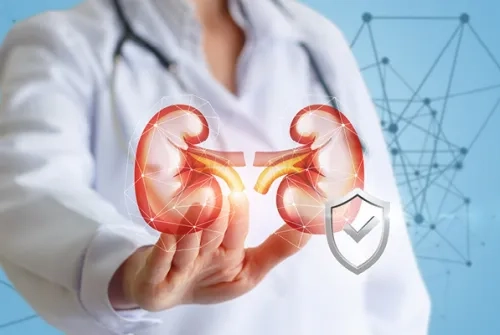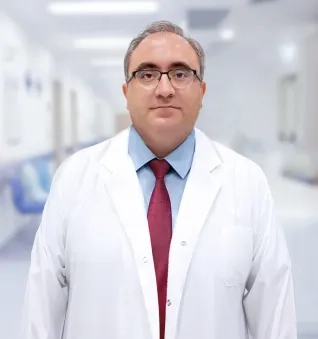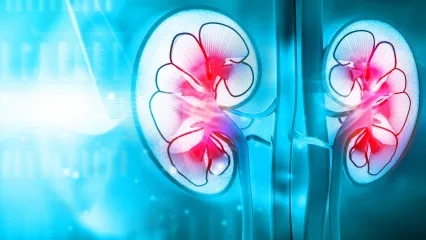Alo Yeditepe
Alo Yeditepe
Chronic Kidney Disease and Treatment Methods
Kidney Failure
The main task of the kidneys is to clean from the blood the remaining portion of the substances taken as food or medicine that needs to be excreted after being used as much as necessary and to excrete them by forming urine. In the event that the kidneys do not work adequately, these substances accumulate in the body. If this condition is reversible, it is called acute kidney disease; if it is long-term and permanent, it is called chronic kidney disease.
Treatment Options for Chronic Kidney Disease
In the early stages of chronic kidney disease, methods such as diet to maintain the current potential of the kidney, avoiding the substances harmful to the kidney, and substituting the substances that the kidney cannot form are primarily applied.
In advanced kidney failure, there are mainly three treatment methods:
- Hemodialysis
- Peritoneal dialysis
- Kidney transplantation
What is Hemodialysis?
Hemodialysis is the name given to the process of cleansing the blood drawn from the patient of substances harmful to the body and of excess fluid by passing it through special filters using a machine. It is the most common treatment method for chronic kidney failure today.
Why Does Hemodialysis Require Preparation?
For the hemodialysis machine to perform adequate dialysis, at least 300-400 ml of blood per minute must go to the filter from a vein in the human body. A vein is used to draw blood easily.
There is no vein in our body with blood flow to that extent. For this reason, it is necessary to establish a vascular access route with high blood flow.
What are the Vascular Access Routes Used for Hemodialysis?
There are three types of vascular access routes;
- Fistula
- Graft (artificial vein)
- Catheter
Peritoneal Dialysis
The peritoneum is a membrane in the abdominal cavity surrounding the abdominal wall and organs. Peritoneal dialysis is the process of cleansing the blood of harmful substances and ensuring fluid balance using the patient's own abdominal membrane by delivering special fluids to the abdominal cavity. For this treatment to be performed, a thin, soft tube is inserted into the abdominal cavity through a small operation.
Methods of Peritoneal Dialysis:
COPD (Continuous Outpatient Peritoneal Dialysis)
According to the patient's body structure, a special peritoneal dialysis solution amounting to 100-1000 ml in children and 2000-2500 ml in adults is delivered to the abdominal cavity. The solution delivered to the body is drained after staying in the abdominal cavity for about 4-6 hours and replaced with a new solution. In the meantime, waste substances such as urea, creatinine in the blood, and excess fluid in the body pass into the dialysis solution. The dialysis procedure is performed by the patient 4-5 times a day.
Peritoneal dialysis performed in this way is called COPD (Continuous Outpatient Peritoneal Dialysis).
APD (Automated Peritoneal Dialysis)
The peritoneal dialysis procedure performed at home by machine is called APD (Automated Peritoneal Dialysis). During the night (8-10 hours), while the person sleeps, the machine delivers dialysis fluid to the abdominal cavity, keeps it there for a certain time, and then discharges it.
Kidney Transplantation
It is the transplantation of a healthy kidney from another person to patients with advanced-stage chronic kidney failure. It is necessary to use medications that suppress the immune system to prevent organ rejection after kidney transplantation.
Kidney transplantation is performed in two ways:
- From a Living Donor
- From a Cadaver
All these treatment methods are successfully applied in our hospital.
This content was prepared by Yeditepe University Hospitals Medical Editorial Board.
”
See Also
- Fall from Height Led to Kidney Failure, Saved by Sister's Donation
- What is a Liver Transplant, How is it Done? and Who is it For?
- Journey of Hope from Georgia to Turkey: 63-Year-Old Father Donates Kidney to Son
- Birthday Gift Becomes a Gift of Life: Kidney Donation from Husband of 20 Years
- Can Liver Cancer Be Prevented?
- What is Hypoglycemia?
- Common Misconceptions About Kidney Transplantation
- 19 Years Old Davut MİNAZ, Who Lost 45 Kilos in 4 Months, Clung to Life with His Father's Kidney
- Kidney Diseases and Treatment Methods
- What are the Problems Requiring Gallbladder Surgery?
- Gallbladder Surgery is a Necessity, Not a Choice
- What is Organ Donation?
- 10 Questions About Kidney Transplantation
- How Should the Daily Salt Consumption Amount Be?
- What is Cirrhosis? What Causes Cirrhosis
- Misconceptions About Hypertension
- What is Hypertension?
- Things Wondered About Kidney Transplantation and Organ Donation
- If You Consume More Than 5 grams of Salt...
- The Frequency of Hepatitis Seen in Dialysis Patients Is Decreasing
- 12-Year-Old Tuğba Nur Survived with Transplant
- Excess Protein Does Not Increase Muscle Mass, and It Impairs the Kidneys
- AV FISTULA Should Be Done At The Right Time For Hemodialysis Patients
- Pay Attention to Kidneys in Pregnancy!
- He Held On To Life with His Brother's Kidney
- Recommendations to Strengthen the Immune System
- Kidney Failure Caused by Ear Obstruction
- There is Still a Lot of Misconception About Organ Donation
- He Lost 20 Kilograms in 40 Days for His Wife
- One Out of Every Seven People Has Kidney Disease
- How Should Kidney Patients Be Protected From COVID-19 Coronavirus?
- What is Propolis? How to Use Propolis?
- Improper Nutrition Invites Kidney Failure
- Important Warning from the Expert: “Not Adding Salt to Meals Alone Is Not Enough”
- 8 People a Day Lose Their Lives While Waiting for Organ Transplantation in Our Country
- Attention to Drug Use After Kidney Transplantation!
- Are Your Kidneys Really Healthy?
- Being Thirsty in the Heat Tires the Kidneys!
- Liver Cancer (Tumor) and Treatment
- Tissue Harmony Is Also Important for Success in Kidney Transplant
- Phytotherapy and Immune System
- What is a Kidney Transplant?
- Hereditary Kidney Diseases Are Underrecognized!
Alo Yeditepe








